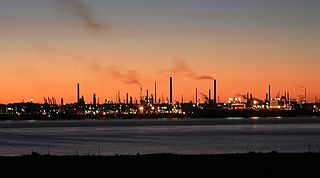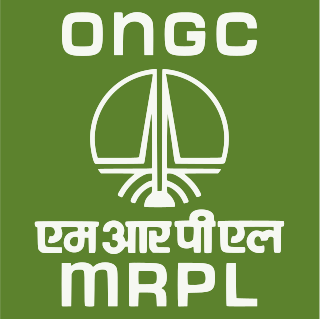
Barauni Refinery in the Begusarai District Bihar state of India was the dream project of the Architect of Modern Bihar Dr. Shrikrishna Sinha alia Sri Babu ,the 1st chief minister of Bihar. It was built in collaboration with the Soviet Union at a cost of Rs.49.4 crores and went on stream in July, 1964. The initial capacity of 1 million tonnes per year was expanded to 3 million tonnes per year by 1969. The present capacity of this refinery is 6.100 million tonnes per year. Indian Oil Corporation has planned to expand its capacity from 6 million tonnes per year to 9 million tonnes per year at the cost of $1.94billion. A Catalytic Reformer Unit (CRU) was also added to the refinery in 1997 for production of unleaded motor spirit. Projects are also planned for meeting future fuel quality requirements.

The Gujarat Refinery is an oil refinery located at Koyali, Vadodara District in Gujarat, Western India. It is the second largest refinery owned by Indian Oil Corporation after Panipat Refinery. The refinery is currently under projected expansion to 18 million tonnes per year.
The Haldia Refinery for processing 2.5 million tonnes per year of Middle East crude was commissioned in January, 1975 with two sectors - one for producing fuel products and the other for Lube base stocks.

Visakhapatnam Refinery, is one of the two oil refineries of HPCL in India, the other being Mumbai Refinery. This was one of the first major industries of Visakhapatnam and first oil refinery on the East Coast. After the nationalisation, HPCL has transformed itself into a mega Public Sector Undertaking and it is second largest integrated oil company in India.

Chennai Petroleum Corporation Limited (CPCL) a wholly owned subsidiary of Indian Oil Corporation (IOCL) and is an Indian oil and gas corporation headquartered in Chennai, India. It was formed as a joint venture in 1965 between the Government of India (GOI), AMOCO and National Iranian Oil Company (NIOC), having a shareholding in the ratio 74%: 13%: 13% respectively. From the grassroots stage CPCL Refinery was set up with an installed capacity of 2.5 million tonnes per year in a record time of 27 months at a cost of Rs. 430 million without any time or cost overrun.

Kochi Refinery (KR) is a crude oil refinery in the city of Kochi in Kerala, India. It is the largest public sector refinery in India with a production capacity of 15.5 million tonnes per year. Formerly known as Cochin Refineries Limited and later renamed as Kochi Refineries Limited, it was acquired by Bharat Petroleum Corporation Limited in the year 2006. The refinery is situated at Ambalamugal, around 12 km (7.5 mi) east of the city centre.

Bongaigaon Refinery is an oil refinery and petrochemical complex located at Bongaigaon in Assam. It was announced in 1969 and construction began in 1972.

Bharat Petroleum Corporation Limited (BPCL) is an Indian government-owned oil and gas corporation. It is under the ownership of Ministry of Petroleum and Natural Gas, Government of India, headquartered in Mumbai, Maharashtra. It operates two large refineries in Kochi and Mumbai. India's second-largest downstream government owned oil corporation, it was ranked 309th on the 2020 Fortune list of the world's biggest corporations, and 792nd on Forbes's 2021 "Global 2000" list.

Hindustan Petroleum Corporation Limited (HPCL) is a subsidiary of Oil and Natural Gas Corporation with its headquarters in Mumbai, Maharashtra. It has a 25% market-share in India among public sector undertakings (PSUs) coupled with a strong marketing infrastructure. Its parent company is ONGC which owns a majority stake in the company. The company is ranked 367th on the Fortune Global 500 list of the world's biggest corporations as of 2016. HPCL was removed from NIFTY 50 INDEX in March 2019 On 24 October 2019, the company became a Maharatna PSU.

GAIL (India) Limited is a government owned natural gas corporation responsible for natural gas processing and distribution in India headquartered in New Delhi, India. It is under the ownership of Ministry of Petroleum and Natural Gas, Government of India. It has the following business segments: natural gas, liquid hydrocarbon, liquefied petroleum gas transmission, petrochemical, city gas distribution, exploration and production, GAILTEL and electricity generation. GAIL was conferred with the Maharatna status on 1 Feb 2013, by the Government of India. Only eight other Public Sector Enterprises (PSEs) enjoy this coveted status amongst all central CPSEs. GAIL was listed in the 131st position among India's most trusted brands according to the Brand Trust Report 2014, a study conducted by the Trust Research Advisory.

Fawley Refinery is an oil refinery located at Fawley, Hampshire, England. The refinery is owned by Esso Petroleum Company Limited, a subsidiary of Exxon Mobil Corporation, which acquired the site in 1925. Situated on Southampton Water, it was rebuilt and extended in 1951 and is now the largest oil refinery in the United Kingdom, and one of the most complex refineries in Europe. With a capacity of 270,000 barrels (43,000 m3) per day, Fawley provides 20 percent of the UK's refinery capacity. An estimated 1000 people are employed at the site.

The BPRefinery (Kent) was an oil refinery on the Isle of Grain in Kent. It was commissioned in 1953 and had a maximum processing capacity of 11 million tonnes of crude oil per year. It was decommissioned in August 1982.

Mangalore Refinery and Petrochemicals Limited (MRPL), is an oil refining company in Mangalore and is a wholly owned subsidiary of Oil and Natural Gas Corporation. Established in 1988, the refinery is located at Katipalla, north from the centre of Mangalore. The refinery was established after displacing five villages, namely, Bala, Kalavar, Kuthetoor, Katipalla, and Adyapadi.

The Tema Oil Refinery (TOR) is one of two crude oil refineries in Ghana.

National Refinery Limited (NRL) is a Pakistani oil refinery which is a subsidiary of UK-domiciled Attock Oil Company. It is based in Karachi, Pakistan.
Bharat Oman Refineries Limited (BORL) is a wholly owned subsidiary of Bharat Petroleum that owns and operates Bina Refinery, located at Bina in the Sagar district of the state of Madhya Pradesh in India. The company was incorporated as a joint venture between Bharat Petroleum Corporation (BPCL) and Oman Oil Company Ltd. Since 2021, it is a wholly owned subsidiary of BPCL. The Bina Refinery was commissioned in May 2011 with an annual capacity of 6 million tonnes. The capacity of the refinery was further enhanced to 7.8 million tonnes per year in 2018.
The oil and gas industry in India dates back to 1889 when the first oil deposits in the country were discovered near the town of Digboi in the state of Assam. The natural gas industry in India began in the 1960s with the discovery of gas fields in Assam and Maharashtra. As on 31 March 2018, India had estimated crude oil reserves of 594.49 million tonnes (MT) and natural gas reserves of 1339.57 billion cubic meters (BCM).
Tüpraş ızmir Oil Refinery is an oil refinery in Izmir, western Turkey. It is owned and operated by Tüpraş, the country's only oil refiner with four refineries.

Barmer Refinery is an upcoming public sector refinery and petrochemical complex in the Pachpadra near Balotra in Barmer district of Rajasthan, India. It is jointly owned by Hindustan Petroleum Corporation Limited (HPCL) and Government of Rajasthan. This refinery will be connected with Jamnagar Refinery and Bathinda Refinery through Amritsar Jamnagar Expressway. Barmar refinery will be second largest crude oil reserve for India.

The Sapugaskanda Refinery is the single largest oil refinery of Sri Lanka. The refinery was built by Iran under the guidance of the Ceylon Petroleum Corporation in August 1969, initially designed to process 38,000 barrels (6,000 m3) per stream day of Iranian Upper Zakum crude oil, and Arabian light crude oil. It was commissioned on 12 October 1969. The facility, which covers an area of 165 acres (67 ha), currently has a capacity of 50,000 barrels (7,900 m3) per stream day.















